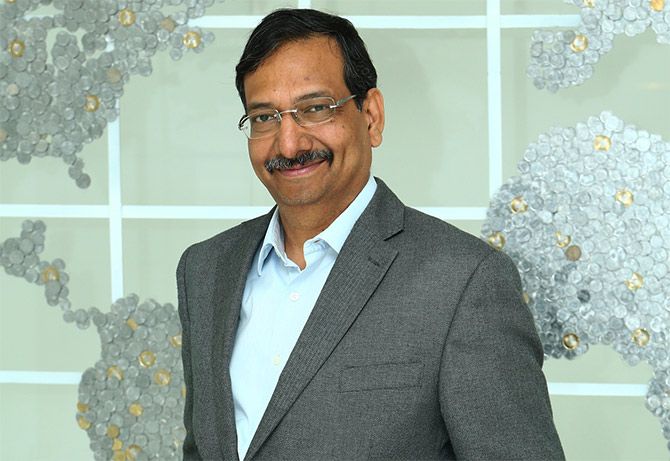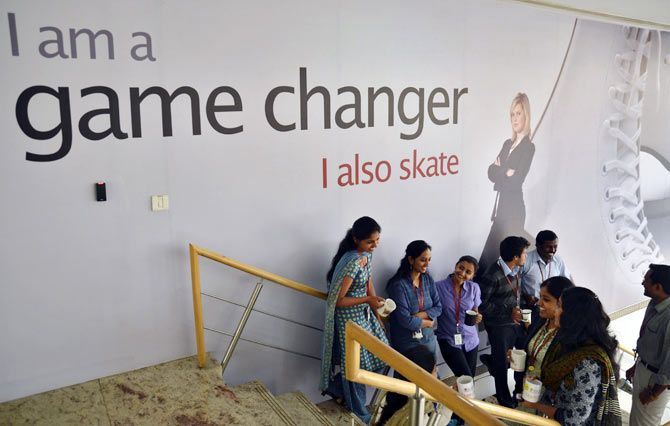
'If they are not ready for a 10 to 20 year journey, they should not become entrepreneurs.'
'They should not get lured by the money they may make in a short period; money may be there today and it may disappear tomorrow.'

He was the son of a government employee, with no background in entrepreneurship but Arun Jain, chairman and managing director, Intellect Design for Digital and Chairman of Polaris Software, had the entrepreneurial spirit even as a school student.
Soon after graduating from the Delhi College of Engineering, he chose to walk the entrepreneurial route with two of his friends. In 1993, he started Polaris Software Lab with just Rs 10,000. By the time he had sold 53 per cent of its share to the US-based company Virtusa last year, it had become a Rs 2,100 crore (Rs 21 billion) company.
Now, his attention is focused on Intellect Design, a products development lab he has created, and on being a mentor and angel investor to young entrepreneurs. He has also launched Start up Nukkad, where young entrepreneurs can meet and share ideas.
He takes Rediff.com's Shobha Warrier through his journey and explains why narendra Modi's Start Up initiative needs to be fine-tuned.
From government jobs to entrepreneurships
When I was young, we were so subservient to government jobs; the only dream every person had -- and this happened after 1947 -- was to get a government job.
Rural India, however, has always been self-sustaining. Every person living in rural India was an entrepreneur. Where were the government jobs there?
I would say the human mind is an entrepreneur's mind, always trying to create something new.
Becoming an angel investor
I became an angel investor to help develop good ideas that will have an impact on society. I tell young entrepreneurs never to say they don't have the money to explore a great idea.
Money should not be the first priority of a start up; it should be problem-solving. Unless you solve somebody else's problem, you will not make money.
They should have the solution to a unique problem. Then I will help them scale up their business.
Being an angel investor, I believe, is not an investment business, but a problem solving business.

Photograph: Adobe Stock
What he looks for in a start-up
I look for two things: The thought process and whether they can solve a social problem. I try to see whether they use their heart to solve the problem; there is a lot of difference between dil (heart) and dimag(head).
An entrepreneur has to have his heart and his head in one place.
I'm interested in how they can help people.
I also see what kind of team they bring with them.
Mentoring
I prefer to call it design thinking. What I am today is because of the image I have of myself. Similarly, I can help a young person to move from the role of a manager to a CEO.
When I mentor a start up, I help them develop their self-image to that of a CEO. They are not going to be a technician or sales person for their company; they are going to head it.
The role of the mentor is to help them change their self-image.
Advice for young entrepreneurs
They have to be passionate about what they do. Their idea should solve a problem and they should try to go deep into the problem before coming up with a solution. They should never try to feed the customer with superficial solutions.
If they are not ready for a 10 to 20 year journey, they should not become entrepreneurs. They should not get lured by the money they may make in a short period; money may be there today and it may disappear tomorrow.
They should always prepare themselves for failure and for days without a salary.
Bullish about India
All the people who made money in the last 15 to 20 years are first generation entrepreneurs.
First generation wealth creates a different outcome from second generation wealth, as the second generation is only a trustee of the wealth.
While the first generation can take any decision about the wealth they have created, the way second generation wealth is spent can be questioned.
While a Nandan Nilekani or a Narayana Murthy can do whatever they want with the money they made, those from TVS Sons cannot spent the money as they wish because they are accountable to the trustees.
Thanks to the first generation wealth creators, there will be a lot of capital in the country that can be invested in good causes.
See, our needs are limited. We still live in the same house. We do not have 20 or 40 servants in the house. In fact, in my house, my wife cooks food for us.
So when I get Rs 600 crores (Rs 6 billion) from selling my shares of Polaris, what will I do with the money? I will invest in good causes like good ideas, education and healthcare in both urban and rural India.

Youngsters with amazing ideas
It warms my heart to see a lot of great ideas coming from young people. I won't say it is the incubation centres that are helping them come up with such amazing ideas; it's because the world is wide open in front of them.
They know what is happening in Silicon Valley, they see what people like Mark Zuckerberg have achieved at such a young age and they get inspired.
Some want to make money, but some want to improve society. Today, great changes are taking place in society as parents and society itself are supporting these youngsters as they chase their dreams.
Unless there are entrepreneurs with fresh ideas to solve problems, a country will not prosper.
What does an entrepreneur do? He fills a vacuum in people's lives. A successful entrepreneur sees the vacuum and tries to fill it.
What the government must do for start-ups
I feel Modiji is putting a lot of efforts into the Start up India initiative, but the government should look at what Narasimha Rao did in the 1990s for the software industry.
He set up the Software Technology Parks with 100 per cent tax break for 10 years. Today, if software is a $100 billion industry, it is because of the STPs.
On the other hand, the Start Up India initiative has just a 3-year tax break. In three years, a start up is not going to break even.
I feel somebody should advise the government properly. You need a 10-year agenda for start-ups also. I am very disappointed by this.
Similarly, if India wants to manufacture great products, they should have schemes like long tax breaks which will impact industry for a longer period.
India in the next five years
Everybody is obsessed with double-digit growth for the country. Though it can be achieved, I am not fascinated by growth numbers. What fascinates me is what I see in small towns.
The highways and infrastructure-building have changed the face of small towns like, say, Ujjain and Bhubaneswar and Indore. With the kind of highways we have, the distance between Bhubaneswar and Puri is just 45 minutes now. Similarly the distance between Indore and Ujjain has lessened.
Highways will change the face of India. See, America built its highways in the 1930s and early 1940s before World War II. America developed in the 1950s and 1960s because it had the infrastructure.
That is why I believe the next 20 years are really bullish for India. By then, we will have infrastructure and we will consume too. What's the need to depend on the rest of the world then?
Today, we talk only about the urban economy. No, we cannot imitate the model America followed. America has 300 million people and we have 1.5 billion people.
We need to build local economies or local clusters in rural areas. We need village clusters formed by joining 10 to 15 villages. Then, we don't need subsidies for villages as there are lots of opportunities there.
The more I work in rural areas with social impact programmes, the more I feel our growth is lopsided. Our programmes are imitations of the West. Our ideas should be a combination of Silicon Valley and Gandhiji.
We don't just need smart cities, we need smart villages too. If you are planning 100 smart cities, you should plan 10,000 smart villages too as there are six lakh (600,000) villages in the country.
Arun Jain's photograph: Sreeram Selvaraj










